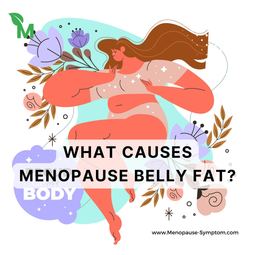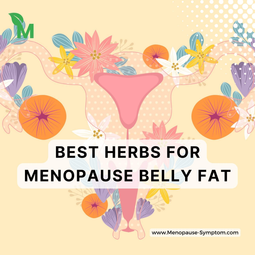As women approach menopause, many experience a frustrating and often unexpected change in their body composition. One of the most common complaints is the accumulation of stubborn belly fat that seems resistant to traditional diet and exercise methods. This phenomenon, often referred to as the "menopause middle," can be both physically and emotionally challenging.
The Science Behind Menopausal Weight Gain
Menopausal belly fat isn't just a cosmetic concern; it's deeply rooted in the hormonal changes that occur during this life stage. As estrogen levels decline, the body's fat distribution shifts, often leading to increased abdominal fat. This type of fat, known as visceral fat, is particularly concerning as it surrounds vital organs and can increase the risk of various health issues.
Why Traditional Methods May Fall Short
Many women find that the weight loss strategies that worked in their younger years are no longer effective during menopause. This is because the body's metabolism slows down, and muscle mass naturally decreases, making it harder to burn calories and maintain a lean physique. However, this doesn't mean that managing menopausal belly fat is impossible – far from it. With the right approach, including natural remedies and targeted supplements, you can effectively address this common concern.
The Role of Diet in Combating Menopausal Belly Fat
When it comes to tackling menopausal belly fat, diet plays a crucial role. While there's no one-size-fits-all solution, certain dietary changes can make a significant difference in managing weight and reducing abdominal fat during menopause.
Embrace a Mediterranean-Style Diet
Research has shown that adopting a Mediterranean-style diet can be particularly beneficial for women dealing with menopausal weight gain. This eating pattern emphasizes:
Plenty of fruits and vegetables
Whole grains
Lean proteins, especially fish
Healthy fats from sources like olive oil and nuts
Limited processed foods and added sugars
The Mediterranean diet not only supports weight management but also offers numerous other health benefits, including improved heart health and reduced inflammation.
Focus on Fiber-Rich Foods
Increasing your fiber intake can be a game-changer when it comes to managing menopausal belly fat. Fiber helps you feel fuller for longer, reducing overall calorie intake. Additionally, it supports healthy digestion and can help balance blood sugar levels. Aim to include a variety of fiber-rich foods in your diet, such as:
Leafy greens (spinach, kale, collard greens)
Berries (strawberries, blueberries, raspberries)
Legumes (lentils, chickpeas, beans)
Whole grains (quinoa, oats, brown rice)
The Power of Protein
Protein is essential for maintaining muscle mass, which naturally declines during menopause. By increasing your protein intake, you can help preserve lean muscle and boost your metabolism. Good sources of protein include:
Lean meats (chicken, turkey, lean beef)
Fish (salmon, tuna, sardines)
Eggs
Plant-based options (tofu, tempeh, legumes)
Aim to include a source of protein with each meal to help keep you satisfied and support your body's metabolic needs.
Exercise Strategies for Menopausal Belly Fat
While diet is crucial, combining it with the right exercise routine can significantly enhance your efforts to combat menopausal belly fat. Let's explore some effective exercise strategies tailored for women going through menopause.
The Importance of Strength Training
As we age, particularly during menopause, maintaining muscle mass becomes increasingly important. Strength training not only helps preserve muscle but can also boost metabolism and promote fat loss, especially around the midsection. Consider incorporating the following into your routine:
Bodyweight exercises (squats, push-ups, lunges)
Resistance band workouts
Weight lifting (start with light weights and gradually increase)
Aim for at least two to three strength training sessions per week, focusing on all major muscle groups.
High-Intensity Interval Training (HIIT)
HIIT has gained popularity for its effectiveness in burning fat and improving cardiovascular health. These workouts involve short bursts of intense exercise followed by periods of rest or lower-intensity activity. HIIT can be particularly beneficial for menopausal women as it:
Boosts metabolism for hours after the workout
Improves insulin sensitivity
Takes less time than traditional cardio workouts
Start with one or two HIIT sessions per week, gradually increasing as your fitness improves.
The Benefits of Yoga and Pilates
While high-intensity workouts are important, incorporating gentler forms of exercise like yoga and Pilates can provide numerous benefits for menopausal women:
Improved flexibility and balance
Stress reduction, which can help manage cortisol levels
Core strengthening, which can help improve posture and reduce the appearance of belly fat
Try to include at least one yoga or Pilates session in your weekly routine to complement your other exercise efforts.
Natural Supplements for Menopause Belly Fat
While diet and exercise form the foundation of any effective strategy to combat menopausal belly fat, certain supplements can provide additional support. It's important to note that supplements should be used in conjunction with a healthy lifestyle, not as a replacement for it.
Omega-3 Fatty Acids
Omega-3s, particularly those found in fish oil, can be beneficial for menopausal women. These essential fatty acids may help:
Reduce inflammation in the body
Support heart health
Potentially aid in fat loss, especially when combined with exercise
Consider adding a high-quality fish oil supplement to your daily routine, or increase your intake of fatty fish like salmon and mackerel.
Green Tea Extract
Green tea has long been praised for its potential weight loss benefits. The catechins found in green tea, particularly EGCG (epigallocatechin gallate), may help:
Boost metabolism
Increase fat oxidation
Reduce body fat, especially in the abdominal area
While drinking green tea can be beneficial, a concentrated green tea extract supplement may provide more potent effects.
Probiotics
The health of our gut microbiome plays a crucial role in overall health and weight management. Probiotic supplements can help:
Improve digestion
Reduce bloating
Potentially aid in weight loss and fat reduction
Look for a high-quality probiotic supplement that contains a variety of beneficial strains.
Vitamin D
Many women, especially those going through menopause, are deficient in vitamin D. This important nutrient plays a role in:
Bone health
Mood regulation
Potentially aiding in weight management and reducing abdominal fat
Consider having your vitamin D levels checked and supplementing if necessary.
Lifestyle Factors That Impact Menopausal Belly Fat
While diet, exercise, and supplements are important, other lifestyle factors can significantly impact your ability to manage menopausal belly fat. Let's explore some key areas to focus on.
Stress Management
Chronic stress can wreak havoc on your body, particularly during menopause. High levels of the stress hormone cortisol can lead to increased abdominal fat storage. To combat this:
Practice mindfulness or meditation
Engage in relaxing activities like reading or gardening
Consider stress-reducing therapies like massage or acupuncture
Prioritize Sleep
Quality sleep is crucial for overall health and can impact weight management. During menopause, many women experience sleep disturbances. To improve your sleep:
Stick to a consistent sleep schedule
Create a relaxing bedtime routine
Keep your bedroom cool and dark
Avoid screens before bedtime
Limit Alcohol Consumption
While a glass of wine might seem like a good way to unwind, excessive alcohol consumption can contribute to menopausal belly fat. Alcohol:
Is high in empty calories
Can disrupt sleep patterns
May increase appetite and lead to poor food choices
If you choose to drink, do so in moderation and be mindful of its impact on your overall health and weight management goals.
The Power of Herbal Remedies
Herbal remedies have been used for centuries to address various health concerns, including those related to menopause. While scientific evidence varies, some women find relief from menopausal symptoms and support for weight management through certain herbs.
Black Cohosh
Black cohosh is a popular herb for menopausal symptoms. While it's primarily known for helping with hot flashes, some women report that it helps with:
Mood swings
Sleep disturbances
Overall well-being, which can indirectly support weight management efforts
Dong Quai
Often referred to as "female ginseng," dong quai has been used in traditional Chinese medicine for menopausal symptoms. It may help:
Balance hormones
Reduce hot flashes
Support overall health during menopause
Maca Root
Maca is a root vegetable that has gained popularity as a superfood. For menopausal women, it may:
Help balance hormones
Increase energy levels
Potentially support weight management efforts
While these herbal remedies show promise, it's important to consult with a healthcare professional before adding them to your regimen, especially if you're taking other medications.
The Importance of a Holistic Approach
As we've explored throughout this article, managing menopausal belly fat requires a multifaceted approach. It's not just about finding the right supplements or following a strict diet – it's about embracing a holistic lifestyle that supports your changing body.
Embracing Body Positivity
While it's natural to want to manage your weight and feel your best, it's equally important to cultivate a positive body image during this transitional time. Remember that your body is going through significant changes, and some alterations in shape and size are normal and healthy.
Seeking Support
Navigating menopause can be challenging, and you don't have to do it alone. Consider:
Joining a support group for menopausal women
Working with a nutritionist or dietitian who specializes in menopause
Consulting with a fitness trainer who understands the unique needs of menopausal women
Celebrating Your Journey
Menopause is a natural part of a woman's life journey. While it comes with challenges, it can also be a time of growth, self-discovery, and empowerment. As you work on managing menopausal belly fat, remember to:
Celebrate your body's strength and resilience
Focus on how you feel, not just how you look
Set realistic, health-focused goals rather than solely aesthetic ones
Conclusion: Your Path to a Healthier, Happier Menopause
Managing menopausal belly fat is possible with the right approach. By combining a nutrient-rich diet, targeted exercise routines, appropriate supplements, and positive lifestyle changes, you can effectively address this common concern. Remember, there's no one-size-fits-all solution – what works best for you may take some experimentation and patience.
As you embark on this journey, keep in mind that your worth is not defined by your waistline. Focus on nourishing your body, staying active, and cultivating a positive mindset. With persistence and self-compassion, you can navigate this new chapter of life with confidence and vitality.
"Menopause is not the end of life, but the beginning of a new, empowering chapter. Embrace the changes, nourish your body, and celebrate your journey."
By adopting a holistic approach to managing menopausal belly fat, you're not just working towards a flatter stomach – you're investing in your overall health and well-being for years to come. Here's to a healthy, happy, and empowered menopause!
Source: Team MPS compiled, analyzed and wrote. Please dont reup without source of us. Many thanks.

What Causes Menopause Belly Fat?
Invalid Date

Best Herbs For Menopause Belly Fat
Invalid Date

Supplements For Menopause Belly Fat
Invalid Date

